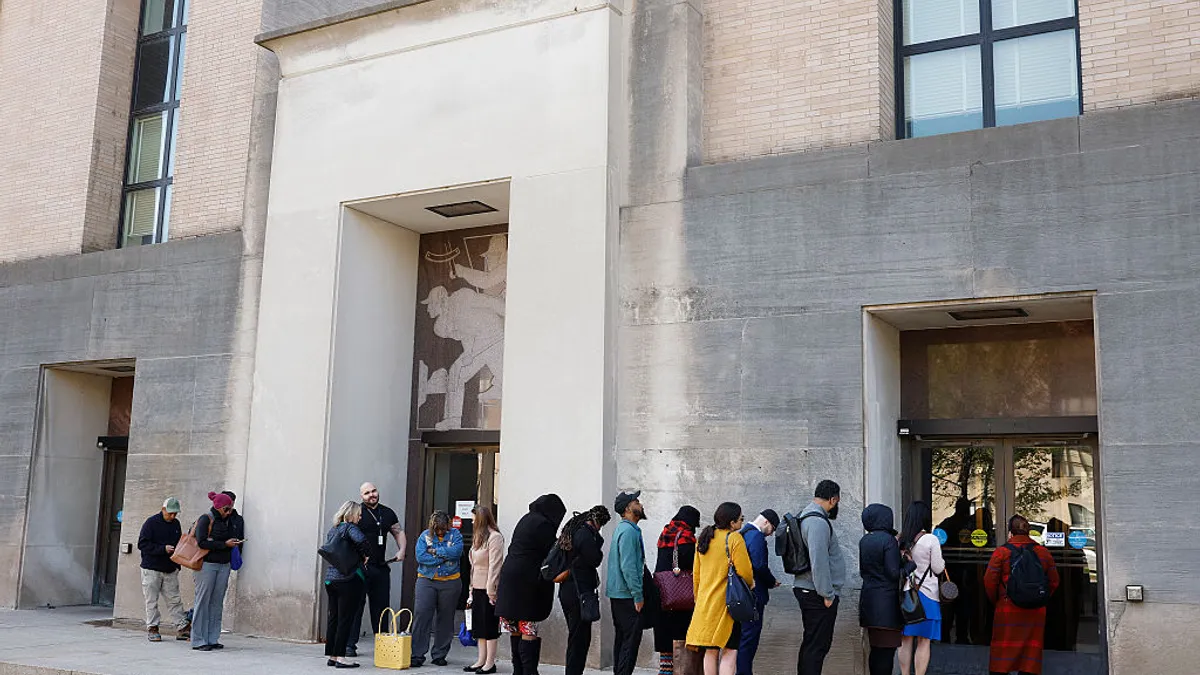A massive round of job cuts hit HHS this week, impacting a wide range of staffers of all rank and file. And more details about who exactly got the boot are starting to emerge.
An entire team devoted to FDA communications was among the 3,500 agency employees who were fired on Tuesday, NPR reported. Staffers inside the FDA’s Office of New Drugs, Office of Policy and International Engagement and Office of Regulatory Programs were also let go, according to CNN.
A handful of leaders were also among those to depart the FDA, including regulator Dr. Peter Stein, director of the agency’s OND.
DEI initiatives were a major target of the cuts, and offices focused on eliminating health disparities at HHS and CMS are now slated to close.
At CDC, senior leaders devoted to infectious diseases were axed alongside researchers working inside the agency’s divisions for HIV prevention, substance abuse and mental health, as well as immunization and respiratory diseases.
A key advisor to HHS Secretary Robert F. Kennedy Jr. defended the widespread cuts at a Politico healthcare summit yesterday, calling federal health agencies an “utter failure.”
“Any business in the world, if you went into it with the metrics that HHS has overseen with skyrocketing costs and has caused to skyrocket worse and worse outcomes, with extremely little innovation from industry on actual chronic disease reversal and prevention … you would of course fire a bunch of people and you would of course install new leadership to put that mantle down,” said Calley Means, the co-founder of TrueMed and a staunch advocate for Kennedy’s Make America Healthy Again agenda.
Yet, feedback from other healthcare leaders has generally been less supportive of the dramatic reduction in health agency staff. Here’s what several industry watchdogs have said in response to what one FDA employee called a “bloodbath” at HHS.
The FDA’s ‘gold standard’ regulatory process is at risk
“We recognize the need to find efficiencies but it’s critical the FDA has the expertise and capacity it needs to maintain its gold standard regulatory review. The rapid and substantial changes at FDA this week raise questions about the agency’s ability to fulfill its mission to bring new innovative medicines to patients.”

Alex Schriver, senior vice president of public affairs at PhRMA, said in an email to PharmaVoice on April 2. PhRMA is the biopharma industry’s largest trade association and has lobbied for changes to Biden-era policies such as the Medicare price negotiation program.
The loss of FDA’s team for user fees could hamper patient access
“AAM is deeply concerned by reports that key officials within the FDA’s generic drug and biosimilar programs and officials responsible for administering the industry user fee programs were let go from the agency. While we support improving FDA efficiency to deliver more affordable generic and biosimilar medicines to patients faster, many of the reported cuts appear to do the opposite.”

John Murphy III, president and CEO of Association for Accessible Medicines, a trade association that aims to improve access to medicines and advocate for generic and biosimilar manufacturers.
A smaller FDA staff will pressure the agency’s new commissioner
“The single most pressing priority for Commissioner [Dr. Martin] Makary is figuring out what FDA can still do, given a workforce that is at least 18% smaller through [reduction in force] and closer to 23% smaller if voluntary separations and buy-outs are included. Equally important, he will have to figure out what the FDA cannot do or cannot complete in a specific timeframe … and address statutory, congressional and stakeholder concerns.”

Steven Grossman in an April 2 blog post to his “FDA Matters” website. Grossman is president of HPS Group, a policy and regulatory consultant, former deputy assistant secretary for health at HHS, and co-founder of Alliance for a Stronger FDA.
The political environment is infiltrating science
“Biomedical research performed at and supported by the NIH is responsible for improving the public health of millions of Americans and people around the world. The loss of staff will leave a gap of knowledge, institutional history and expertise that will damage the research landscape. …Research funding decisions should be made based on scientific merit and public health priorities, not the politics of the day. Introducing political influence into the research process creates an environment where scientists cannot rely on consistent, stable funding sources.”

A March 28 statement from The Endocrine Society, an industry association with 18,000 members that aims “to advance excellence in endocrinology.” The society also voiced concern about the Department of Government Efficiency’s oversight of NIH research grants.
Cuts limit CDC’s ability to respond to viral outbreaks
“Federal systems are being hollowed out and reduced to a shell. At CDC, it’s as if only some of infectious disease matters, and the rest of public health is expendable. This is hard to reconcile, given [Kennedy's] previous messaging about the importance of chronic disease. It also ignores that chronic and infectious diseases are deeply linked. Zika and pregnancy. Obesity and COVID. Health doesn’t exist in silos. Public health isn’t something you can pause and expect to pick back up later. It’s built on decades of momentum and lessons learned.”

Katelyn Jetelina in an April 1 post to her “Your Local Epidemiologist” newsletter. Jetelina is an epidemiologist, senior scientific consultant to the CDC and adjunct professor at Yale School of Public Health. She is in the early stages of launching the Health Trust Initiative, a health communications resource.
Cuts at CDC will be costly and dangerous
“Public health is often invisible — until it fails. Without these programs, there will be more ... Americans dying unnecessarily. The U.S. already spends more on healthcare than any other nation yet suffers among the highest rates of preventable deaths. Slashing programs that work upstream — preventing costly and deadly diseases before they happen — will make this worse. And this is not just about lives lost; it is about dollars wasted. Every preventable hospitalization, every untreated chronic condition, every outbreak that could have been stopped early costs far more than the investments needed to prevent them.”

Dr. Thomas Frieden in an op-ed published April 1 by STAT News. Frieden is CEO and president of the global health organization Resolve to Save Lives, a former director of the CDC and former commissioner of the New York City Health Department.
Mass workforce reductions will impact ongoing measles outbreaks
“These firings make a lot of sense if you believe measles spreading like wildfire is good — or think we should be slashing cancer research. While Republicans work to pass more tax breaks for billionaires, Trump, Musk and RFK Jr. are ripping essential health services away from the American people and decimating our country’s ability to prevent outbreaks and keep families safe. There’s no two ways about it: this is the type of carelessness that gets people killed.”

An April 1 statement from Sen. Patty Murray (D-WA). Murray was among a handful of Democratic senators who penned a letter to HHS Secretary Robert F. Kennedy, Jr. on March 31 demanding more information about the planned job cuts to federal health agencies ahead of this week’s layoffs.









